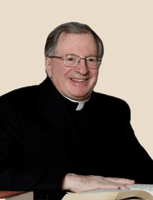Four issues ago (4/11) Rabbi Daniel Polish contributed a heartfelt piece to these pages on Jewish attachment to Israel (“A Spiritual Home: What Christians Should Know About Jewish Identity”). “When Jews visit Israel, its landscape and historical sites speak in more intimate terms,” he wrote. “It is the embodiment of the Jews’ collective past, situating us in our history and evoking its meaning.” Rabbi Polish was eager to explain “Jews’ spiritual attachment to Israel” to America readers because, as he wrote, “To me as a Jew, Christian discussion of Israel seems to exist in the realm of social issues and foreign policy deprived of spiritual significance.”
It is true, as Rabbi Polish wrote, “The two communities stub their toes on a single issue, the State of Israel.” But the problem, I would argue, is not the State of Israel but the policies at certain times of particular governments of Israel as they affect the native Christian communities in the Holy Land. Some of those policies are the same policies that pain Rabbi Polish and many other American Jews. But differences over government policy, when they do exist, should not obscure the spiritual attachment Catholics too have for Israel.
Catholic attachment to the Holy Land, including Israel, differs from that of Jews, for in Christ all lands are holy. All the same, Israel has a special place in the Christian tradition. Christian attachment to the Holy Land, including Israel, it begins with reverence for Jews’ roots in the land together with a commitment to Israel as a homeland for the Jewish people. All the same, we hold a spiritual attachment to the land and its people, both Christian and Jewish. And sadly, Catholic attachment to the native Arab Christians is a stumbling block in our relations with many Jews. Let me begin, at least, to explain those ties.
Like all Christians, through baptism Arab Christians belong to the one body of Christ. We share a profound sacramental bond with them deeper than our distinctive national identities. When something affects them, it affects us. So just as Paul pleaded for the diaspora communities to contribute to the impoverished church in Jerusalem, we are ready to stand by Arab Christians in their need today. The church of Jerusalem, moreover, is the mother church from which the disciples, including Peter, went forth to found new churches around the world. So the churches outside Israel and Palestine owe the Christians of the Holy Land a historical religious debt as well.
As for Jews, so for Christians, the land of Israel is a kind of sacrament. It is, in a phrase, “the Fifth Gospel,” which brings the four written Gospels to life. Blessed John Paul II wrote, it is “that special land...in which the redemption of the human race was accomplished ‘once and for all’...the earthly homeland of Christ who walked about it ‘preaching the gospel of the kingdom and healing every disease and infirmity,’” the land “in which more than any other place the word of God was brought to men” (“Redemptionis Anno,” 1984).
We believe, as Pope John Paul II wrote, that the Holy Land “contains communities of believers full of life, whose presence the peoples of the whole world regard as a sign and source of hope.”
Not just the preservation of the Christian presence in the Holy Land, therefore, but its flourishing is something we long for. For us, the Christian presence must never be reduced to historical traces and empty museums. It is built of living stones, which are the people themselves. Policies that adversely affect the Arab and other Christians in the Holy Land hurt the church as the one body of Christ. When Catholics address issues of Israeli policy, then, it is to keep the Christian presence alive in the land of our redemption.









As a member of this Christian community, who has emigrated to the US, I would like to point to the good father that we are proud of our Palestinian ethnicity, which he avoids mentioning, but we do acknowledge our Arab heritage.
Albert E Hazbun